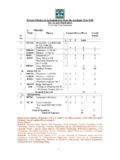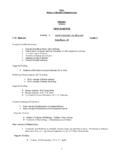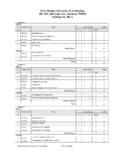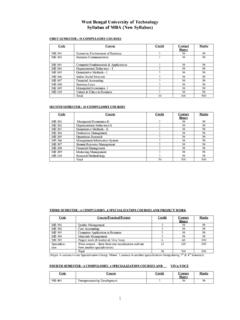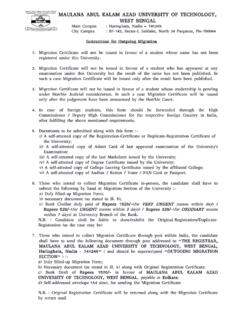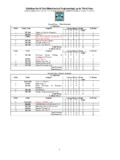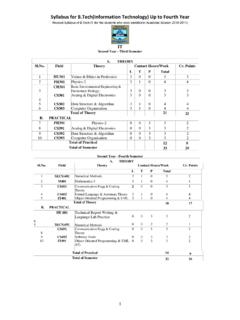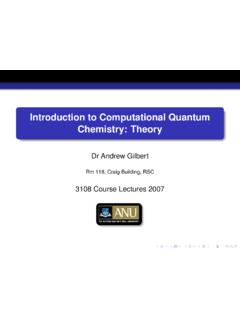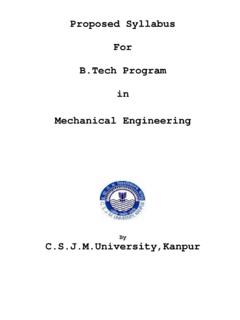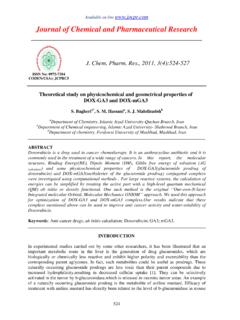Transcription of B.Sc DEGREE COURSE (Hons)
1 Syllabus for three-year DEGREE COURSE ( hons ) in Biotechnology 11 DURATION : Six Semesters (Three Years) Total Marks = 3600 Theoretical Papers 24 Papers (Marks = 2400) Total Credit = 16 Credits per semester = 6 x 16 = 96 Practical / Project Papers 12 papers (Marks = 1200) Total Credit = 4 Credits per semester = 6 x 4 = 24 Total Credit in 6 Semesters = 96 + 24 = 120 4 credit (Theory) means 3 lecture hours & 1 Tutorial per week or 42 lectures per semester per paper 2 credit (Lab.) means at least 40 hours of lab work per semester per paper COURSE STRUCTURE 1. In view of the increasing demand for training manpower in the area of Molecular Biology, Genetic Medicine and Biotechnology, it was consensus of the committee (Faculties & experts) that this COURSE should be broad based and should be able to give a good insight into modern biology and important component of hands+on training to the students.
2 Thus by nature it will be an interdisciplinary COURSE . 2. a) For admission, students from Science stream with 10+2 (HS exam) or equivalent, ISC, CBSE exam will be eligible. b) Admission will be through selection test CET (Common Entrance Examination) and also on the basis of the merit. c) The number of students for this COURSE to be admitted this year will be 60. 3. The fee structure should be on no grant basis as applicable to technical courses. BSc : Biotechnology ( hons ) Syllabus FIRST SEMESTER Paper (Theoretical) : Paper Code Name of the Paper Marks Credit hrs Classes / Semester MSA+101 Macromolecular Structure & Analysis 100 3+1 42 BPI+102 Biophysics & Instrumentation 100 3+1 42 CSD+103 Cell Structure & Dynamics 100 3+1 42 BMT+104 Biomathematics - I 100 3+1 42 CH+101 Chemistry (Pass) 100 3+1 42 Syllabus for three-year DEGREE COURSE ( hons ) in Biotechnology 22CA+101 Introduction to Computer (Pass) 100 3+1 42 Paper (Practical).
3 BMI 192 Basic Microscopy & Instrumentation 100 2 40 BCH 191 Biochemistry 100 2 40 CH+191 Chemistry (Pass) 100 2 40 CA+191 Introduction to Computer (Pass) 100 2 40 SECOND SEMESTER Paper (Theoretical) : Paper Code Name of the Paper Marks Credit hrs Classes / Semester OMB+201 Organic Mechanisms in Biology 100 3+1 42 PTG+202 Principles of Transmission Genetics 100 3+1 42 POM+203 Principles of Microbiology 100 3+1 42 BMT +204 Biomathematics - II 100 3+1 42 CH+201 Chemistry (Pass) 100 3+1 42 CA+201 Introduction to C-Programming & Digital Logic (Pass) 100 3+1 42 Paper (Practical) : CGT 292 Cyto-genetic Techniques 100 2 40 MIC 293 Microbiology 100 2 40 CH+291 Chemistry (Pass) 100 2 40 CA+291 Introduction to C-Programming & Digital Logic (Pass) 100 2 40 THIRD SEMESTER Paper (Theoretical).
4 Paper Code Name of the Paper Marks Credit hrs Classes / Semester MCG+301 Microbial Genetics 100 3+1 42 POI+302 Principles of Immunology 100 3+1 42 PAT+303 Plant and Animal Tissue Culture Techniques and applications 100 3+1 42 PBT+304 Plant Biotechnology 100 3+1 42 CH+301 Chemistry (Pass) 100 3+1 42 Syllabus for three-year DEGREE COURSE ( hons ) in Biotechnology 33CA+301 Introduction to Data Structure & Computer Organization (Pass) 100 3+1 42 Paper (Practical) : IMN 392 Immunology 100 2 40 TCT 393 Tissue Culture Techniques 100 2 40 CH+391 Chemistry (Pass) 100 2 40 CA+391 Introduction to Data Structure & Computer Organization (Pass) 100 2 40 FOURTH SEMESTER Paper (Theoretical) : Paper Code Name of the Paper Marks Credit hrs Classes / Semester MOG+401 Molecular Genetics 100 3+1 42 CBB+402 Computational Biology & Bio-informatics 100 3+1 42 BDT+403 Biodiversity & Taxonomy 100 3+1 42 ABT +404 Animal Biotechnology 100 3+1 42 CH+401 Chemistry (Pass) 100 3+1 42 CA+401 Introduction to DBMS, Computer Network & Numerical Analysis (Pass) 100 3+1 42 Paper (Practical).
5 MBT 491 Molecular Biology Techniques 100 2 40 BIN 492 Bio-informatics 100 2 40 CH+491 Chemistry (Pass) 100 2 40 CA+491 Introduction to DBMS, Computer Network & Numerical Analysis (Pass) 100 2 40 FIFTH SEMESTER Paper (Theoretical) : Paper Code Name of the Paper Marks Credit hrs Classes / Semester DPB+501 DNA Typing, Proteomics & Beyond 100 3+1 42 RDT+502 Recombinant DNA Technology 100 3+1 42 EVB+503 Environmental Biotechnology 100 3+1 42 IBT +504 Industrial Biotechnology 100 3+1 42 Syllabus for three-year DEGREE COURSE ( hons ) in Biotechnology 44 Paper (Practical) : GET+591 Genetic Engineering Techniques 100 2 40 BFT 592 Basic Fermentation Techniques 100 2 40 SIXTH SEMESTER Paper (Theoretical) : Paper Code Name of the Paper Marks Credit hrs Classes / Semester MHG+601 Model Organisms in Human Genome Project 100 3+1 42 EME+602 Elements of Management & introduction to Entrepreneurship 100 3+1 42 MBT+603 Medical Biotechnology 100 3+1 42 BTL+604 Biotechnology Social, Legal & Ethical issues 100 3+1 42 Paper (Practical).
6 PRO 691 Project on Biodiversity 100 2 40 DSS 692 Dissertation on Biotechnology 100 2 40 BSc (H) Syllabus in Biotechnology FIRST SEMESTER Paper Code : MSA 101 (Theoretical) Full Marks : 100 Credit : 4 (3+1) Paper Name : Macromolecular Structure & Analysis Lecture period : 42L 1. Carbohydrates : Structural aspects Introduction & Occurrence, Classification of Mono+, Di+ and Polysaccharides, Reducing & Non+reducing Sugars, Constitution of Glucose & Fructose, Osazone formation, Pyranose & Furanose forms, Determination of ring size, Inter+conversion of mono+saccharides. (4 Periods) 2. Lipids : Structural aspects General introduction, Classification & Structure of Simple & Compound lipids, Properties of Lipid aggregates (elementary idea), Biological membrane, Membrane protein structural aspects, Lipoproteins (elementary idea).
7 (4 Periods) 3. Proteins : Structural aspects General introduction, Classification & General characteristics, Structure of Primary, Secondary, Tertiary & Quaternary proteins (elementary idea), + & + Syllabus for three-year DEGREE COURSE ( hons ) in Biotechnology 55chains of proteins (elementary idea), Classification of Amino acids. (5 Periods) 4. Nucleic acid : Structural aspects Components of DNA and RNA, Nucleosides & Nucleotides (introduction, structure & bonding), Double helical structure of DNA (Watson+Crick model), various forms of DNA. (5 Periods) 5. Chemical & Enzymatic Kinetics + An introduction to enzyme; How enzyme works; Reaction rate; Thermodynamic definitions; Principles of catalytic power and specificity of enzymes; Enzyme kinetics Approach to mechanism.
8 (5 Periods) 6. Genes are DNA DNA is the genetic material, DNA is a double helix, DNA replication is semi+conservative, mutations change the sequence of DNA, a gene codes for a single polypeptide, recombination occurs by physical exchange of DNA, genetic code is triplet. (5 Periods) 7. Mutation Occurrence, kinds of Mutation, spontaneous & induced Mutation, Mutagens, detection of Mutation, Lethal Mutations, Biochemical Mutations, Phenotypic effects of Mutation, Molecular basis of Mutation, Significance & Practical applications of Mutation. (4 Periods) 8. Expression of genetic information : from Transcription to Translation - The Relationship between genes and protein, The transcriptions : The basic process, Transcription and RNA Processing in Eukaryotic Cells, Encoding genetic information, Decoding the codons : the role of transfer RNAs.
9 (5 Periods) 9. Regulation of mRNA stability capping, polyadenylation, pre+mRNA splicing, formation of commitment complex, creation of catalytic sites, trans+esterification reactions, mRNA surveillance. (5 Periods) Paper Code : BPI -102 (Theoretical) Full Marks : 100 Credit : 4 (3+1) Paper Name : Biophysics & Instrumentation Lecture period : 42L 1. General Biophysical methods Measurement of pH, Radioactive labeling & counting, Autoradiography. (3 Periods) 2. Separation & Identification of Materials + concept of Chromatography (Partition Chromatography, Paper Chromatography, Adsorption Chromatography, TLC, GLC, Ion Exchange Chromatography, Gel Chromatography, HPLC, Affinity Chromatography); Electrophoresis (Gel Electrophoresis, Paper Electrophoresis).
10 (8 Periods) 3. Centrifugation Basic Principle of Centrifugation, Instrumentation of Ultracentrifuge (Preparative, Analytical), Factors affecting Sedimentation velocity, Standard Sedimentation Coefficient, Centrifugation of associating systems, Rate+Zonal centrifugation, sedimentation equilibrium Centrifugation. (5 Periods) 4. Microscopy Light microscopy, Bright & Dark Field microscopy, Fluorescence microscopy, Phase Contrast microscopy, TEM, SEM. (6 Periods) 5. X-Ray Crystallography X+ray diffraction, Bragg equation, Reciprocal lattice, Miller indices & Unit cell, Concept of different crystal structure, determination of crystal structure [concept of rotating crystal method, powder method].

